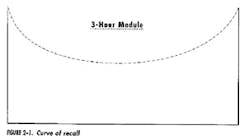Sharpen the axe.
Two men were chopping wood together. One worked constantly, breaking only for a quick lunch. The other man took frequent breaks throughout the day. By day's end, the first man was stunned to see that the second had cut much more wood.
Every time I looked, you seemed to be resting. But you've accomplished more than I have. How did you do it?
The second man replied,
Didn't you notice that while I was sitting down, I was sharpening my axe?
Dale Carnegie told this story often in his world renowned seminars. Brain research supports Carnegie's wisdom about taking breaks to sharpen the axe.
Current neuroscience research is revealing how our brain naturally learns. This research has generated brain-compatible learning. It's exciting stuff.
For the first time in history... we have the opportunity and challenge to understand and act on the biology of learning rather than simply following traditional practices. [Jane McGeehan]
A whole lot of training gets lost.
Brain scientists have long known that people tend to remember what they hear at the beginning and end of any body of information - whether a unit of instruction, a speech, list, story, book, or movie. This is known as the Primacy and Recency Effect. This recall looks like diagram 2-1, top right.
But, presumably all the information in your training is important. So what about the stuff in the middle?
If people remember beginnings and endings best, we need to create more beginnings and endings in our training. Enter Bluma Zeigarnik.
Interruptions improve recall.
Zeigarnik was a Soviet psychologist/psychiatrist who found that interrupting a task periodically - even one that was going well - could lead to substantially better recall. She theorized that an incomplete task or unfinished business creates "psychic tension" within us. This tension motivates us toward finishing the task or business. In Gestalt terms, we seek "closure."
Regardless of why interruptions improve recall, it has been established that they do. Applying this science to the previous 3-hour module would yield the 2nd diagram shown right.
Training time is a premium, I know. But packing more information into the time available doesn't create more learning. Making training brain-compatible does.
Not all breaks are created equal.
Now let's add to the Ziegarnik effect the Von Restorff Effect, named after another psychologist, Hedwig von Restorff. She established that from a large amount of information we remember best the stuff that's different or stands out.
For example, study the following for 10 seconds, then look away and see what you can remember:
- Run
- Write
- Laugh
- Fix
- Copy
- Duck billed platypus
- Trace
- Edit
- Tally
- List
- Draw
I'm betting everyone remembered "duck billed platypus," at the very least. The same thing happens when we highlight material a different color from the surrounding text.
Information that is colorful, surprising, bizarre, exotic, humorous, or otherwise different - stands out and we remember it better. That's because it arouses both our attention and our emotions.
This brain science urges us to break up our training information with colorful, engaging activities. The new training module is represented by the third diagram shown right.
Brain-compatible training is the bottom-line.
No matter how important your topic is, no matter how critical it is for your recruits or officers to "get up to speed," science shows their brains need "chunked" instructional time to assimilate and remember information. Brain-compatible training provides this.
Stay tuned for some quick and easy, brain-compatible break ideas.
Next month (February 16th - give or take a day or two) we'll look at some brain-compatible breaks (I'm not talking about the bathroom or cigarette kind) you can easily use to fire up your learners' brains for better attention and recall.
About the Author

Val Van Brocklin
Described by Calibre Press as "the indisputable master of enter-train-ment," Val Van Brocklin is an internationally sought speaker, trainer and noted author. She combines a dynamic presentation style with over 10 years experience as a prosecutor where her trial work received national media attention on ABC's Primetime Live, the Discovery Channel's Justice Files, in USA Today, The National Enquirer and REDBOOK. In addition to her personal appearances, she appears on television, radio, and webcasts, in newspapers, journal articles and books. Visit her website: www.valvanbrocklin.com.
